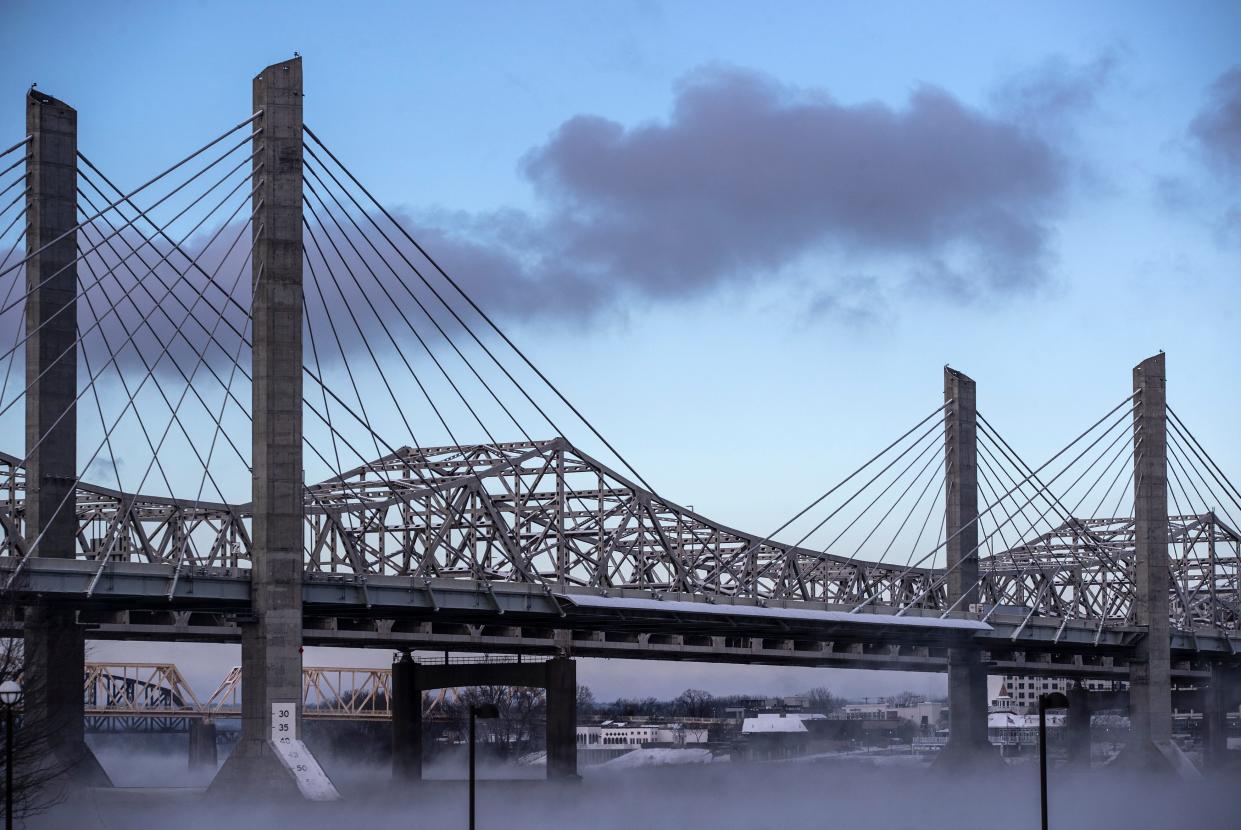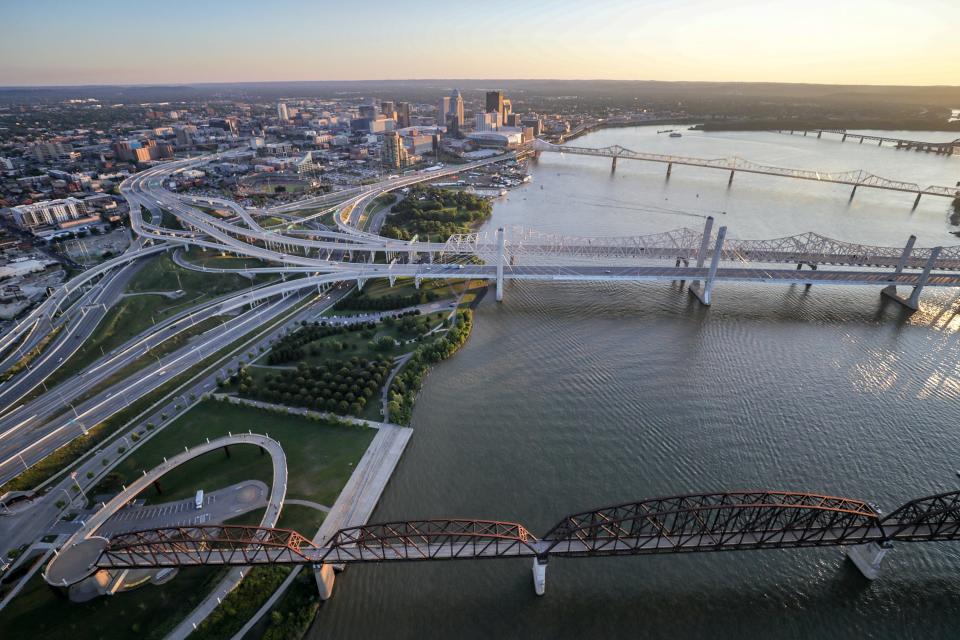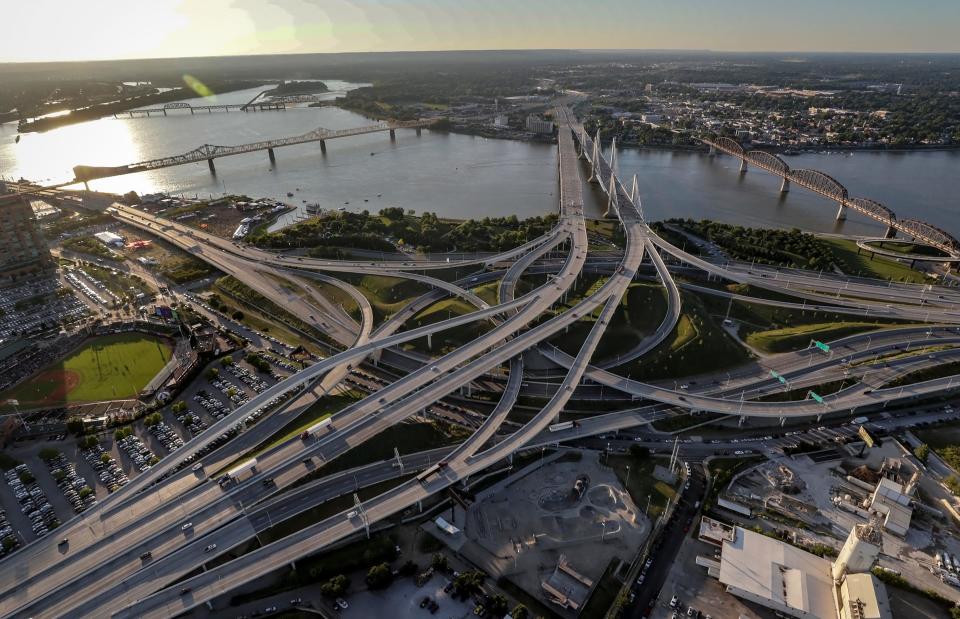Bridge toll pushback: Metro Council members join Louisville outcry over Brent Spence plan

- Oops!Something went wrong.Please try again later.
UPDATE: Metro Council members voted during an April 14 meeting to approve the resolution calling for federal infrastructure funding to end tolls on the three bridges connecting Louisville and Southern Indiana.
Mayor Greg Fischer's call for tolls to be eased on the bridges connecting Louisville to Southern Indiana is picking up steam at city hall.
Seven Metro Council members have sponsored an ordinance urging Kentucky Gov. Andy Beshear and Indiana Gov. Eric Holcomb to put federal infrastructure money toward the Ohio River Bridges Project and, in turn, end tolling along three bridges connecting Louisville to Jeffersonville and the surrounding region. The resolution was approved on a 6-1 vote Tuesday by the Public Works Committee and will go before the full council next month.
Metro Council President David James, one of the bill's sponsors, told The Courier Journal last week that the ordinance was written as a joint resolution with Fischer's office, though it's something he'd considered since Beshear and Ohio Gov. Mike DeWine announced last month that a new untolled bridge would be built between Covington, Kentucky, and Cincinnati.
Valley Station: Louisville officials approve plan allowing drug rehab center to open in heart of Valley Station subdivision
"They're going to give Northern Kentucky a free bridge, but the citizens of Louisville are paying for two (new) bridges," James said. "It's not quite fair."
James' comments mirrored remarks made by Fischer this month in which he pushed for money from the Infrastructure Investment and Jobs Act to be put toward the Ohio River Bridges Project, citing an "obvious contrast" between funding mechanisms for the Louisville crossings and the new bridge in the Cincinnati area during an interview with The Courier Journal.
Today, we’re asking Gov. Beshear, Gov. Holcomb and KY & IN legislators to consider investing in Louisville's economy & people by directing federal infrastructure funds to the Ohio River Bridges Project. pic.twitter.com/4yKAL2WvOP
— Mayor Greg Fischer (@louisvillemayor) March 2, 2022
Holcomb's office previously declined to comment, while the Kentucky Transportation Cabinet said it would evaluate how the money could be used in coming months. And in a press conference earlier in March, Beshear said he wasn't sure whether the infrastructure cash would be eligible to be used on a development that had already been completed, adding that those funds could be better suited for other projects around the region.
Speaking to committee members Tuesday, James recommended adding an amendment to the ordinance that would allow additional funding mechanisms to be used to lift the tolls if "limitations on using these federal funds" were found.
An effort decades in the making, the Ohio River Bridges Project was completed in 2016 and opened two new bridges in the Louisville area – the Abraham Lincoln Bridge, which connects northbound drivers with Jeffersonville via Interstate 65, and the Lewis and Clark Bridge, which offers a two-way crossing from Prospect in eastern Jefferson County into Utica, a small Southern Indiana town in Clark County. Both bridges and the preexisting Kennedy Bridge are tolled, with rates bumping up each summer.
For Courier Journal subscribers: Here's what's planned at the former site of a Cadillac dealership in downtown Louisville
Several freeway ramps near Louisville's urban core were reconfigured as part of the project as well, and traffic patterns on the Kennedy Bridge, which had served northbound and southbound drivers on I-65 since opening near downtown in 1963, were converted to only serve drivers heading south into Kentucky.
The project came with a $2.5 billion price tag, to be paid in part by steadily rising tolls on the three crossings as part of an agreement that funded the project without relying on the federal government. By the end of 2020, according to the ordinance, nearly $387 million had been collected from tolled drivers who used the bridges.
Current rates for smaller cars without a RiverLink account include $4.42 payments to cross the river, with larger vehicles charged $7.73 and 18-wheel trucks spending $13.26 to cross. Vehicles with prepaid RiverLink accounts pay lower fees per trip – small cars are charged $2.21, mid-sized vehicles pay $5.53 and large trucks are charged $11.04.

Drivers have options to avoid payments. They can cross the Ohio River via the untolled George Rogers Clark Memorial Bridge, which connects Jeffersonville to downtown Louisville at Second Street, or the untolled Sherman Minton Bridge, connecting western Louisville with New Albany.
RiverLink, the company that runs the tolling system, reported 27.4 million crossings on the three tolled bridges in 2020, a decrease of 18% from 2019, when 33.6 million crossings were reported. The company's 2020 annual progress report notes crossings took their biggest hit in spring 2020, at the onset of the coronavirus pandemic, but rebounded later in the year. Regardless, toll revenue that fiscal year dropped 10%.
They may not agree on many issues, but Metro Councilman Anthony Piagentini, a Republican representing District 19 and one of the ordinance's seven sponsors, said he was "completely glad to be on the same page with the mayor." Keeping Louisville's bridges tolled while opening up a free crossing in Covington sends the wrong message, he said.
Read more: Walmart is closing a Louisville location. Here's why and what's next
"This is one of those things that there's just complete, bipartisan, every area of the city is saying the same thing," Piagentini told committee members. "... Almost $400 million have already been paid in tolls, including myself, for these bridges.
"Louisville, really, at this point, we'll be getting penalized for taking the initiative. (That's) the message this would send," he added. "... What this will do is that future governments and local jurisdictions like ours won't take the initiative to do these types of things and instead will sit around and wait – because why would they do this again, and put the local constituents through it, on the risk that down the road somebody may come with the money?"
Still, that bipartisan support didn't extend to every committee member.

Brent Ackerson, a Democrat representing District 26, said a plan is already in place to fund the bridges, and it includes tolls paid by those who use the crossings, such as trucking companies and interstate travelers. The fees can be avoided by hopping on the Second Street bridge, he added, or by taking the Sherman Minton into New Albany.
"If the toll is that big of a deal, there's an easy way around it," Ackerson said. "I'm not in favor of saying that we use dollars that could be used elsewhere in Louisville or throughout the state because what benefits the state also benefits Louisville, plain and simple."
Ackerson was the lone committee vote against the ordinance, which was later approved by Metro Council at its meeting on April 14.
Correction: A previous version of this story misstated how many crossings were recorded on Louisville's three tolled bridges in 2020. The correct number is 27.4 million.
Lucas Aulbach can be reached at laulbach@courier-journal.com, 502-582-4649 or on Twitter @LucasAulbach.
This article originally appeared on Louisville Courier Journal: Louisville Metro Council members push to end Ohio River bridge tolls

